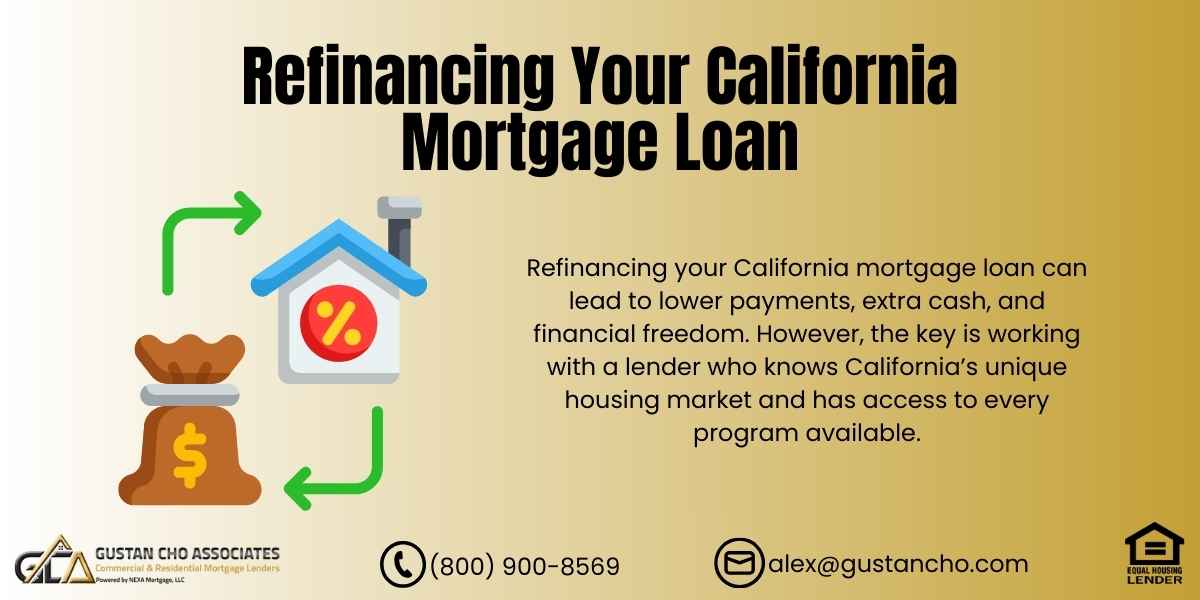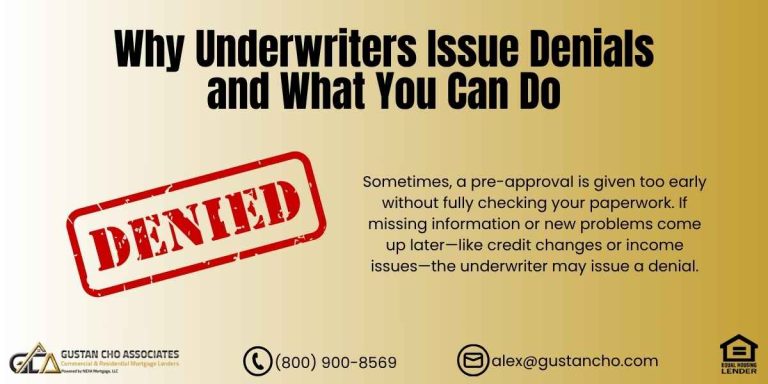Refinancing Your California Mortgage Loan in 2025: A Complete Guide
If you’re a California homeowner, you’ve probably heard friends or neighbors discussing refinancing. With home values soaring and mortgage rates shifting, refinancing your California mortgage loan can be one of the smartest money moves you make this year.
Refinancing can give you a fresh start if you want to lower your monthly payment, pull out cash, or eliminate costly mortgage insurance.
At Gustan Cho Associates, we help California borrowers every day with no lender overlays and the most flexible loan programs in the nation. In this guide, we’ll walk you through everything you need to know about refinancing your California mortgage loan in 2025 — in plain language.
Why Homeowners Are Refinancing Their California Mortgage Loan
There are many reasons why homeowners think about refinancing. Some do it to save money each month. In contrast, others want to use their home equity for big goals like debt consolidation or remodeling. The most common reasons for refinancing your California mortgage loan include:
- Lowering your current interest rate and monthly payment
- Switching from an FHA loan to a conventional loan to remove mortgage insurance
- Taking cash out of your equity to pay off debt or invest in home improvements
- Changing your loan term (e.g., from a 30-year to a 15-year loan)
- Switch from an adjustable-rate mortgage to a fixed-rate mortgage for more stability.
Thanks to rising property values, California homeowners often have more equity than borrowers in other states. That makes refinancing an even stronger option here.
Refinance Your California Home Today
Lower your payments and secure better rates with expert guidance.
Understanding the Basics of Refinancing Your California Mortgage Loan
Refinancing is just swapping out your current mortgage for a new one. The new loan pays off the old one, and you get to start over with fresh terms.
When refinancing your California mortgage loan, here’s what you can expect:
- Application & Pre-Approval – You’ll complete a refinance application. At Gustan Cho Associates, our pre-approvals are fully underwritten, so you know upfront where you stand.
- Rate & Program Selection – We’ll help you compare loan types such as FHA, VA, Conventional, or non-QM refinance programs.
- Appraisal & Underwriting – Depending on the loan type, your home may need an appraisal to confirm its value.
- Clear to Close – Once conditions are satisfied, you’ll sign your new loan documents.
- Funding – Your old loan is paid off, and your new loan begins.
The key is making sure refinancing saves you money or helps you achieve your goals.
Refinancing Your California Mortgage Loan to Eliminate PMI
Refinancing your California mortgage loan can help you remove mortgage insurance, making it a smart choice for many homeowners. If you’ve got an FHA loan, you might be stuck paying an annual mortgage insurance premium (MIP) for the life of the loan, which can add up over time.
On the flip side, if you have a conventional loan, you can remove private mortgage insurance (PMI) once you reach 20% equity in your home. That’s great news because PMI can hit your monthly budget pretty hard.
Due to rising home values in California, many FHA loan holders now have enough equity to refinance into a conventional loan. This switch can significantly reduce monthly expenses and save homeowners money over the life of the loan.
Lowering Monthly Payments by Refinancing Your California Mortgage Loan
If your mortgage payment feels too high, refinancing might bring relief. Even a slight drop in interest rate can mean big savings when spread over the life of the loan.
For example, lowering your interest rate by as little as 0.50% can lead to substantial savings each month, while extending your loan term from 15 years to 30 years can significantly reduce your monthly payments. This approach provides greater flexibility and breathing room within your budget.
At Gustan Cho Associates, we’ll run the numbers with you. Hence, you know exactly how much you’ll save when refinancing your California mortgage loan.
Shortening Your Term Through Refinancing
For a lot of homeowners, wanting to pay off their mortgage faster can lead to thinking about refinancing. Switching from a 30-year mortgage to a 15-year fixed loan can be a smart choice. A 15-year loan usually offers lower interest rates, meaning substantial savings over time.
Taking on a shorter term lets you pay off your mortgage in half the time, so you might save tens of thousands in interest.
Many people in California think a 15-year mortgage is a solid choice, even if the monthly payments are steeper. They feel like it’s worth it as their financial situation improves. This choice is especially attractive for those close to retirement or getting a boost in income because it helps them gain financial freedom sooner. In the end, refinancing can be a great way to shorten your mortgage term and cut down on interest costs.
Save Big by Refinancing Your California Mortgage
Discover how much you can reduce your monthly payment.
Cash-Out Refinancing Your California Mortgage Loan
If you’ve built equity, you can turn it into cash with a refinance. This is called a cash-out refinance.
- FHA Cash-Out Refinance: Up to 80% loan-to-value (LTV)
- Conventional Cash-Out Refinance: Up to 80% LTV
- VA Cash-Out Refinance: Up to 100% LTV for eligible veterans
California homeowners often choose cash-out refinancing to:
- Pay off high-interest credit cards
- Make home improvements
- Cover education or medical costs
- Buy a second home or investment property
The cash is tax-free since it’s considered a loan, not income.
FHA Streamline Refinancing in California
If you’ve got an FHA loan, the FHA Streamline refinance is a super easy way to cut down your payment.
Benefits include:
- No income verification
- No credit score check
- No appraisal required
- Fast closing times
As long as you’ve been on time with your last 12 mortgage payments, you may qualify. For many borrowers, FHA Streamline refinancing your California mortgage loan can cut costs dramatically without the stress of a full refinance.
VA Interest Rate Reduction Refinance Loan (IRRRL)
For veterans and active-duty service members in California, the VA has a sweet refinancing option called the VA Interest Rate Reduction Refinance Loan (IRRRL), or just VA Streamline for short. This program helps you lower your interest rates with great perks, like not needing an appraisal, super simple paperwork, and lower funding fees. If you already have a VA loan, the IRRRL is one of the best ways to refinance your mortgage and save some cash.
Non-QM and Alternative Loan Programs in California
Not every homeowner fits into the traditional box. If you’re self-employed, have unique income sources, or recently had credit issues, Non-QM refinance programs can help.
Options include:
- Bank statement loans (qualify with deposits, not W2s)
- Asset depletion loans
- DSCR loans for investment properties
At Gustan Cho Associates, we specialize in these programs when other lenders say no.
Does Refinancing Your California Mortgage Loan Make Sense in 2025?
Before moving forward, consider:
- Break-even point: How long will it take to recoup closing costs?
- Future plans: Are you staying in the home long enough to benefit?
- Market trends: Rates in 2025 may rise or fall depending on inflation and Federal Reserve policy.
Our team can help you review your numbers so you don’t refinance unless it benefits you.
How to Start Refinancing Your California Mortgage Loan
Getting started is simple:
- Contact Gustan Cho Associates at 800-900-8569 or email us at gcho@gustancho.com.
- Apply online through our secure portal in just minutes.
- Get a full underwritten pre-approval so you know your exact refinance options.
We are licensed in 50 states, including California, and have no lender overlays. That means we can approve loans that other lenders deny.
Final Thoughts
Refinancing your California mortgage loan can lead to lower payments, extra cash, and financial freedom. However, the key is working with a lender who knows California’s unique housing market and has access to every program available.
At Gustan Cho Associates, we pride ourselves on helping homeowners who thought refinancing wasn’t possible. Whether you want to remove PMI, lower your rate, shorten your term, or tap into your equity, our team is here to make it happen.
Borrowers who need a five-star national mortgage company licensed in 50 states with no overlays and who are experts on refinancing your California mortgage loan, please contact us at 800-900-8569, text us for a faster response, or email us at gcho@gustancho.com. The team at Gustan Cho Associates is available 7 days a week, on evenings, weekends, and holidays.
California Homeowners: Refinance With Ease
Get a fast, hassle-free mortgage refinance and lock in lower rates.
Frequently Asked Questions About Refinancing Your California Mortgage Loan:
Q: What Does Refinancing Your California Mortgage Loan Mean?
A: Refinancing your California mortgage loan means replacing your old mortgage with a new one with better terms, like a lower rate, lower payment, or cash-out options.
Q: Can Refinancing Your California Mortgage Loan Lower My Monthly Payment?
A: Yes. If rates are lower or if you move to a longer-term loan, refinancing your California mortgage loan can reduce your monthly payment and give you more room in your budget.
Q: How Do You Know if Refinancing Your California Mortgage Loan Makes Sense?
A: Refinancing your California mortgage loan makes sense if the savings outweigh the costs. We look at your break-even point to see how fast you’ll recover your closing costs.
Q: Can You Remove Mortgage Insurance by Refinancing Your California Mortgage Loan?
A: Yes. Many California homeowners refinance from FHA to Conventional loans once they have 20% equity. Refinancing your California mortgage loan this way removes expensive mortgage insurance.
Q: What is a Cash-Out Refinance When Refinancing Your California Mortgage Loan?
A: A cash-out refinance means you borrow more than your current loan balance and take the difference in cash. Refinancing your California mortgage loan this way can help pay off debt, remodel, or invest.
Q: Do You Need Good Credit for Refinancing Your California Mortgage Loan?
A: Not always. While higher scores get better rates, programs like FHA, VA, or Non-QM loans make refinancing your California mortgage loan possible even with lower credit.
Q: How Long does Refinancing Your California Mortgage Loan Take?
A: Most refinances close in about 30 days, but FHA Streamline or VA Streamline loans can be faster. At Gustan Cho Associates, we work to close quickly with full underwritten approvals.
Q: Can Veterans Benefit from Refinancing Their California Mortgage Loans?
A: Yes. Veterans can use VA cash-out or VA Streamline (IRRRL) programs. Refinancing your California mortgage loan with VA benefits may allow 100% financing and fewer requirements.
Q: What Documents are Needed for Refinancing Your California Mortgage Loan?
A: You may need pay stubs, tax returns, or bank statements, depending on the loan type. Some programs, like FHA Streamline, require little to no paperwork for refinancing your California mortgage loan.
Q: How do I Start Refinancing My California Mortgage Loan with Gustan Cho Associates?
A: It’s easy. Call us at 800-900-8569, email gcho@gustancho.com, or apply online. We’ll guide you through every step of refinancing your California mortgage loan.
This article about “Refinancing Your California Mortgage Loan” was updated on August 20th, 2025.
Lower Your Mortgage Rates in California
Refinance your loan and take control of your finances today.










